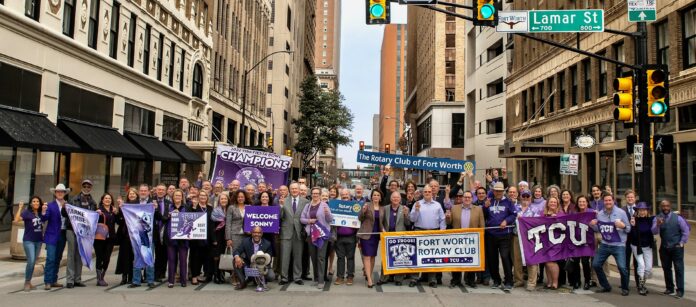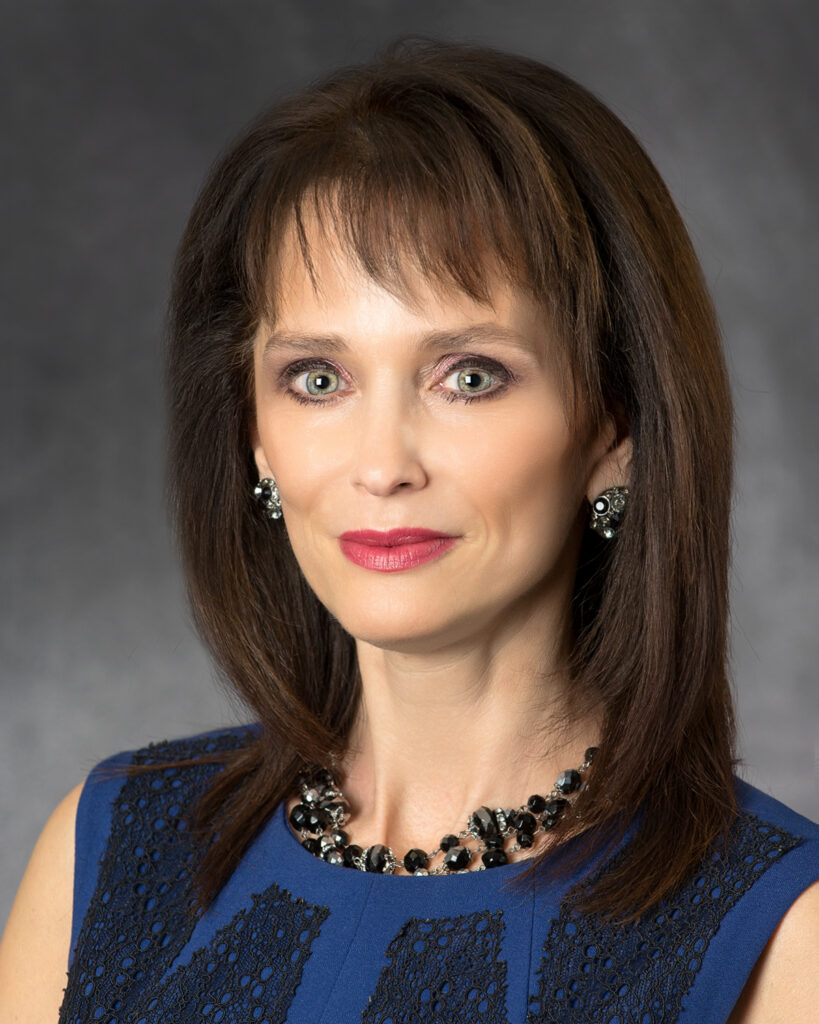J.E. Mitchell didn’t fully comprehend the depth of his future legacy when he agreed to serve as the first chairman of the Rotary Club of Fort Worth. The partner in Mitchell-Greer Jewelry Company was among a dozen Fort Worth community leaders who helped form the 75th chartered Rotary Club in the world.
Rotary International now boasts almost 37,000 active clubs.
While the club recognizes its first official meeting to have been June 28, 1913, the formal planning began four months earlier, with a February 24 session. That group of 12 represented much of Fort Worth’s leadership at the time, and those men were:
- J.E. Mitchell – Miller Greer Jewelry Co.
- Dr. H.M. Walker – Ray & Walker
- Harry J. Adams – President of Sandegard Grocery Company
- Sam Johnson – Manager of Texas Bitulithic Company
- J.F. Henderson – Manager of Southwestern Bell Telephone
- Dr. Frank Boyd – Boyd & Head
- G.E. Cranz – Terminal Grain Co.
- Coke W. Harkrider – Investment broker
- C.C. Martin – Covey & Martin Drug Stores
- A.L. Steubinger – Fakes & Co.
- Bismarck Heyer – Leyhe Piano Co.
The club grew rapidly and over successive decades, members represented a virtual “who’s who” among all sectors of the community.
Early members included Amon G. Carter, Samuel Burk Burnett, Ben E. Keith and many others whose descendants and businesses have continued to play dynamic roles in our community’s growth. Beyond commerce, members have a long history of participating in civic life and influencing local government.
Many mayors have been Fort Worth Rotarians, including Captain B. B. Paddock, one of the city’s earliest and arguably greatest mayors. Others followed, including Dr. R. H. W. Dreshsel, T.J. Harrell, Roscoe L. Carnrike, John Justin, Willard Barr, DeWitt McKinley, Clif Overcash, Hugh Parmer, Bob Bolen, Ken Barr, Kay Granger, Mike Moncrief and Betsy Price.
Other notable members have included architect Wiley Clarkson, David Tandy, John Roach, Harry Werst, Preston Geren, Pete Geren, Gordon Boswell, Gib Lewis, Jim Wright, Robert Bass, Dee Kelly and Van Cliburn. It’s not uncommon to find successive family generations serving among Rotary ranks, as with J.B. Baker (who joined in 1914), his son Ed L. Baker Sr. (club president 1946-47) and granddaughter Louella Baker Martin, who joined in 1999.
The face of Rotary changed significantly in 1987 following a U.S. Supreme Court decision respecting a California state statute that required business organizations to admit women. Under the leadership of then-club president Ken Barr, the Fort Worth club quickly followed suit – admitting 20 women within six months. Kay Granger was among the first women to join that year; she went on to serve on the Fort Worth City Council and as mayor and now chairs the House Appropriations Committee in the U.S. Congress. Other early female members included Erma Johnson Hadley, Judith Carrier and Zem Neill – the latter two serving as the first and second female presidents of the club in 1994-1995 and 2003-2004, respectively. I am the sixth woman to serve as club president and no doubt many more will follow.
On the world stage, Rotary International’s role is to provide humanitarian service, help build goodwill and peace in the world, and to encourage high ethical standards in all vocations. It is well-known for its slogan “Service Above Self” and the Four-Way Test:
- Is it the TRUTH?
- Is it FAIR to all concerned?
- Will it build GOODWILL and BETTER FRIENDSHIPS?
- Will it be BENEFICIAL to all concerned?
The Four-Way Test serves as a litmus test for all interactions, both business and personal in nature. In this way, Rotary serves as a guardian of business ethics and virtue. We embrace the premise put forth by founder Paul Harris in 1905 at Rotary’s inception: The true Rotary spirit is not the selfish one of trying to see how much you can get out of your fellow members but the more altruistic one of trying to see how much benefit and good you can do for your fellow members.
In 1963, as the club celebrated its Golden Anniversary, then President Sam “Buck” Weatherford III asked, “Who can measure accurately the contributions of Rotarians to our city during the fifty year history of the Fort Worth Rotary Club?” Then as now, a response is nearly impossible to quantify – though the club maintains an ongoing legacy of magnificent service. Over these past 110 years, members have donated tens of millions of dollars toward our local community and the world at large, including these snapshots of service projects:
- A 1914 fundraiser exhibition baseball game between “Fat” and “Lean” teams raised $1,200 for Presbyterian “Cumberland Rest” for elderly women – roughly $37,000 in today’s dollars.
- In 1921, Rotarian Ben E. Keith was asked to solicit subscriptions that raised $4,000 (or $64,000 in today’s dollars) to organize a Boys Band for underprivileged boys. That same year, the club established an educational foundation that actively issued college loans for many decades. Originally set up with a $27,000 revolving fund – or $432,000 today – most of these loans were successfully repaid.
- Rotarians again answered the call during WWII. A resolution was adopted to the effect that the club would focus all efforts on War Bonds, scrap drives, and numerous other war efforts. This work continued for several years, and in 1943 the club’s greatest activity was under the club’s War Activities Committee, which set a goal of selling $5 million in war bonds. Within thirty days, members had exceeded that goal and sold approximately $8.5 million – $148.5 million in today’s dollars – representing 1,939 separate sales by Rotarians. At that time, we had 22 active Rotarians deployed in service, along with 91 sons of active Rotarians and 44 of our foundation students.
- Millions in member donations to The Rotary Foundation for global good works – including $25,221 in 1966 alone (nearly $237,000 in today’s dollars).
- In 1960 and the years that followed, the club formed its own Endowment and Children’s Fund with all monies benefitting Tarrant County residents. This year, over $110,000 in grants were awarded to 26 local organizations – with wide-ranging missions including the USS Fort Worth, Roll Call of North Texas, Big Brothers and Big Sisters, Meals on Wheels, Fort Worth Youth Orchestra, Cancer Care Services and many more.
- Other key initiatives over the years include: A.) prominent roles in establishment of the Child Study Center, Panther Boys Club (now known as the Boys and Girls Club), Better Business Bureau, Community Chest, United Fund and United Way in Tarrant County; B.) the establishment of Rotary Park, which served as the first headquarters of the Fort Worth Parks Department and site of the first public bathhouse in Fort Worth (the park was rebuilt in 2013 for our centennial celebration as Rotary Plaza at Trinity Park); C.) Creation of Fort Worth Citizens Organized Against Crime and Crime Stoppers – today known as the Safe City Commission; D.) The Thomas R. Windham Award, which honors top recruits from the Police and Fire Academy classes.
- This year we sponsored our first Interact high school club at Young Women’s Leadership Academy. We continue to sponsor the Rotaract Club of Fort Worth for young professionals, in addition to ongoing support of 3rd grade literacy at Maudrie Walton Elementary School, and support of high school students in the Four-Way Speech Contest and Rotary Youth Leadership Awards (RYLA) scholarships.
- In keeping with Rotary’s peacekeeping mission, the club will mark this anniversary year with a special Peace Monument installation at the Fort Worth Botanic Garden, in process now. This project echoes a 1933 club donation that funded climbing roses in the Botanic Gardens.
As the club observed its 75th anniversary in 1987, then-President Ken Barr wrote this: “Few worthwhile endeavors take place in Fort Worth without Rotarians being in the forefront ‘making things happen.’ And that fact leads men and women who want to make their city a better place to live, to want to be Rotarians. It is this magical combination that has led our club to become such an important element in the business and civic fabric of Fort Worth.”
Then as now, we must continually evolve and recommit ourselves and our club to the issues of the day, building upon the rich tradition of service set for us.
As Rotarians, our goal is to bring about meaningful change in ourselves and our communities, both here at home and abroad. Since 1913, our club has always played an important role in terms of service, philanthropy and convening important conversations with a wide range of business and community leaders at weekly lunch meetings. Both locally and on the national stage, Fort Worth Rotarians continue to serve others and seek solutions to our most pressing issues.
Program speakers over the years have included Will Rogers; Gene Autry; Captain Eddie Rickenbacker (WWI flying ace, race car driver, and longtime CEO of Eastern Airlines); renowned newspaper advice columnists Ann Landers and Abigail “Dear Abby” Van Buren; diverse leaders such as Braniff CEO Howard Putnam (who spoke to Rotary the week before the airline declared bankruptcy) and Doug Fraser, President of UAW; sports heroes such as Nolan Ryan and Roger Staubach; and in recent months Texas business titans such as John Goff, Steven Butt and Aslam Khan of Falcon Holdings.
Rotary Club of Fort Worth membership rolls have included not only leaders in business, education, health care and many other sectors of the community but individuals serving in key leadership positions such as Tarrant County Judge, district attorney, mayor, city council, police chief, school superintendent and school board trustee.
Shawn Snell is president of the Rotary Club of Fort Worth and has been a member of the club since 2014. A double graduate of the University of Michigan, she says that after having the good fortune of moving to Texas she found her way to Fort Worth as soon as she could. She is liaison for Business Health Services and Executive Health for Texas Health Resources and Texas Health Fort Worth.







